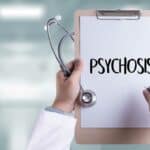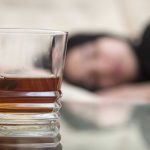High alcohol intake is a major risk factor for chronic health conditions and diseases including cancer, liver disease, brain disorders, and cardiovascular disease.
This is in contrast with moderate alcohol consumption, which is generally believed to provide certain, limited protective effects, reducing the risk of many of these same conditions for moderate drinkers compared to non-drinkers.
However, new studies on the risk of stroke in certain populations have cast doubt on this conclusion, finding that any alcohol consumption may increase the risk of certain types of strokes, with this risk increasing dramatically with higher levels of alcohol consumption.
Types Of Stroke
Like a heart attack, a stroke occurs when the blood supply (and therefore the oxygen supply) to a portion of the brain is cut off. Without oxygen, brain cells begin dying off within minutes, resulting in permanent brain damage, disability, or death.
There are three main types of stroke:
Ischemic Stroke
This form of stroke occurs when blood vessels in the brain become totally or partially blocked, usually due to blood clots breaking loose from the heart, traveling through the circulatory system, and becoming lodged in the brain.
Ischemic strokes are the most common type of stroke, with roughly 4 out of 5 strokes being ischemic.
Hemorrhagic Stroke
A hemorrhagic stroke occurs due to bleeding in the brain, as blood from an injured artery will flow into the brain space rather than the tissue that needs it.
There are two main types of hemorrhagic stroke:
- intracerebral hemorrhage, which occur when the bleeding takes place inside the brain
- subarachnoid hemorrhage, which occur when the bleeding takes place on the surface of the brain
Transient Ischemic Attack
Also known as a warning stroke or mini-stroke, transient ischemic attacks occur when a clot temporarily blocks a blood vessel in the brain before becoming dislodged.
During these events, an individual will likely experience several minutes of symptoms similar to those of a stroke, but without the lasting damage a real stroke would cause.
How Alcohol Abuse Increases The Risk Of Stroke
Problematic drinking habits can put you at a higher risk for stroke in a few different ways.
High Blood Pressure
Heavy drinking is strongly linked with hypertension, or high blood pressure. This is the single greatest risk factor for strokes, as high blood pressure damages and weakens arteries throughout the body, increasing the risk that they will burst, clot, or clog more easily.
High Cholesterol
Alcohol is broken down and rebuilt into triglycerides and cholesterol in the liver. These can then build up, contributing to fatty liver disease, heart disease, and forming stroke- or heart-attack-causing clots on your blood vessel walls.
Type 2 Diabetes
Drinking alcohol is known to change the way the body responds to insulin, a hormone that regulates blood sugar levels. This can result in type 2 diabetes, another major risk factor for strokes.
Health & Weight
Heavy drinking generally results in an overall decline in your physical health, often including malnutrition, reduced metabolism, obesity, and heart disease.
Obesity and coronary heart disease in particular are associated with a dramatically increased stroke risk.
Atrial Fibrillation
Atrial fibrillation is a type of irregular heartbeat linked with alcoholic heart disease. It is known to trigger the formation of blood clots in the heart, increasing stroke risk by up to 500%.
Liver Disease
Alcoholic liver disease greatly increases the risk of hemorrhagic stroke, as liver dysfunction can interfere with the blood’s ability to clot, increasing the risk of deadly bleeding in the brain.
Signs & Symptoms Of Strokes
In contrast with heart attacks, strokes may be completely painless or only cause a headache.
The other symptoms that come with a stroke may vary depending on what part of the brain has been impacted. However, all strokes are extremely dangerous and should be treated as a medical emergency.
Common signs and symptoms include:
- trouble speaking or understanding speech
- vision problems
- sudden numbness, weakness, or paralysis in the face, arms, or legs, often impacting just one side of the body
- sudden severe headache including vomiting, dizziness, and mental confusion
- loss of sensation, balance, or coordination
If you or someone around you begins to experience the signs and symptoms of a stroke, it’s important to call for medical help right away.
Treating Alcohol Use Disorder
While studies and experts disagree as to the safety of moderate drinking and what amount of alcohol may be helpful or harmful for healthy adults to imbibe, there is no disputing the harmful effects of excessive alcohol abuse over time, including the high risk of stroke.
If you or a loved one live with alcohol use disorder, professional treatment services can help. To learn about our outpatient programming, please contact us today.
Sources
Written by
Northeast Addition Editorial Team
©2024 Northeast Addition Center | All Rights Reserved
This page does not provide medical advice.


